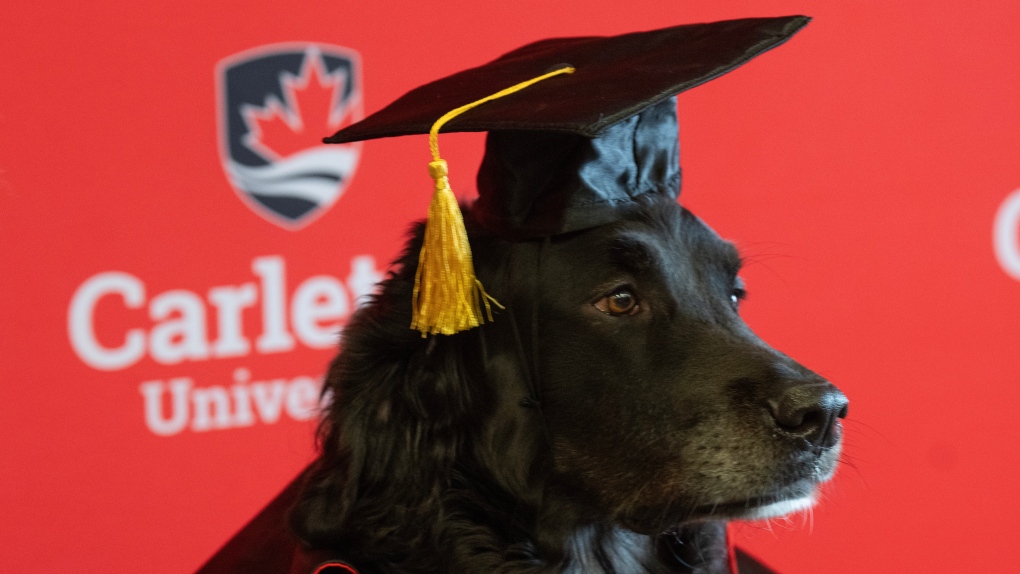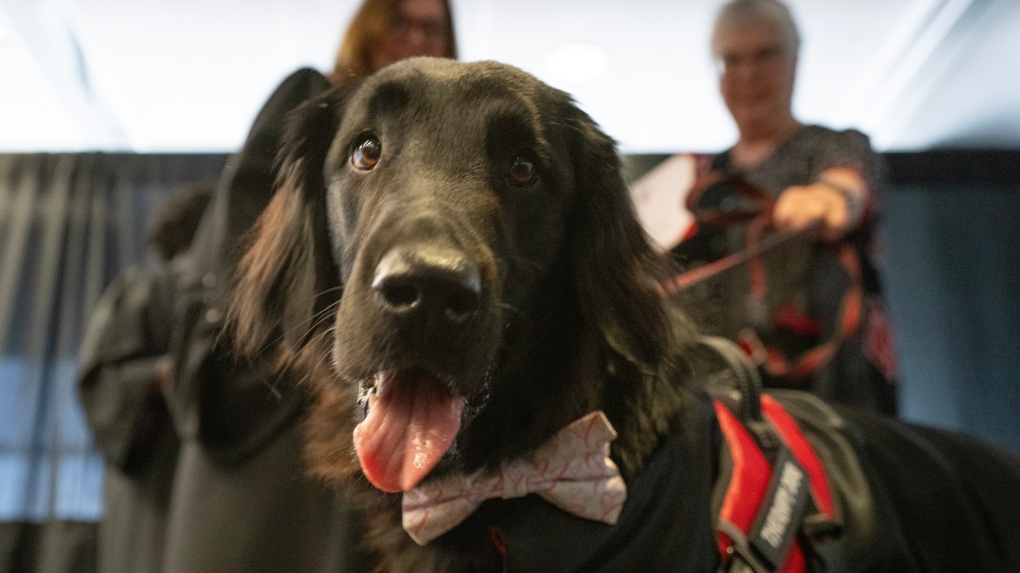Carleton University celebrates therapy dogs with convocation ceremony
 Wearing a graduation cap, therapy dog Gracie poses for a photo during a graduation ceremony for therapy dogs at Carleton University, in Ottawa, Thursday, March 7, 2024. The in-house program is used to support the university community. (Adrian Wyld/THE CANADIAN PRESS)
Wearing a graduation cap, therapy dog Gracie poses for a photo during a graduation ceremony for therapy dogs at Carleton University, in Ottawa, Thursday, March 7, 2024. The in-house program is used to support the university community. (Adrian Wyld/THE CANADIAN PRESS)
Carleton University held a special convocation ceremony this week for some very good boys and girls.
The university celebrated its therapy dogs and their handlers at two ceremonies on Thursday.
During the "pawceedings", the dogs, some wearing little mortarboards, and their handlers crossed the stage, stopping to shake paws with vice-president of students and enrolment and university registrar Suzanne Blanchard.
 Wearing a graduation cap, therapy dog Murphy poses for a photo during a graduation ceremony for therapy dogs at Carleton University, in Ottawa, Thursday, March 7, 2024. The in-house program is used to support the university community. (Adrian Wyld/THE CANADIAN PRESS)
Wearing a graduation cap, therapy dog Murphy poses for a photo during a graduation ceremony for therapy dogs at Carleton University, in Ottawa, Thursday, March 7, 2024. The in-house program is used to support the university community. (Adrian Wyld/THE CANADIAN PRESS)
Therapy dogs help students manage stress, boost moods and provide connection to university staff and mental health services, the university says.
Program founder Shannon Noonan helped launch the program at Carleton University in 2018. There are now 17 dogs in the program.
"As the founder of the therapy dogs program here at Carleton, I'm deeply moved to witness the growth and impact of a vision that began with a simple idea and a loyal companion by my side," Noonan said at the first of two convocation ceremonies Thursday. "This team is full of people who have chosen to create relationships of the highest quality with their dogs in order to work as a cohesive team."
Noonan said the dogs and their handlers help to provide comfort, connection and support to those who need it most.
"Whether it's in the silky touch of a dog's ear, gliding through our fingers; the soulful gaze of deep, brown eyes; or the warmth of a body pressed in the infamous lean that some of you might remember," she said.
Professor in the Department of Psychology and Director of the Psychopathy Research Lab, Adelle Forth, Ph.D., told CTVNewsOttawa.ca by phone that the faculty and staff members who serve as handlers for the dogs know the university and its services well, which can allow them to help direct students to other resources.
"We call it dog therapy, but we don't diagnose or treat anyone ourselves, and neither do the dogs, of course, but it's a space where the students say they feel safe," she said.
 Wearing a bow tie for the occasion, therapy dog Jazz poses for photographers as she walks across the stage during a graduation ceremony for therapy dogs at Carleton University, in Ottawa, Thursday, March 7, 2024. (Adrian Wyld/THE CANADIAN PRESS)
Wearing a bow tie for the occasion, therapy dog Jazz poses for photographers as she walks across the stage during a graduation ceremony for therapy dogs at Carleton University, in Ottawa, Thursday, March 7, 2024. (Adrian Wyld/THE CANADIAN PRESS)
Forth has been with the program since 2018 and says she remembers when Noonan and her dog, Blue, helped provide the spark for the therapy dog program.
"She asked me to come to a session, so I went to watch and when Blue walked in, it just changed the room," she said.
Noonan spoke about Blue, too, at Thursday's event.
"His unwavering loyalty, boundless love and gentle spirit touched the lives of many, laying the foundation for what has become a beacon of hope and compassion on the campus," she said. "I spent a lot of time in my life feeling like I wasn't enough. Blue taught me that I was enough and Carleton facilitated that."
Forth says students, staff and faculty rave about the program.
"It's like a close friend who is always there to support me," Forth quoted one student as saying. "They say it really helps with their anxiety. They just love it. Being around the dogs is a joyful experience."
- Sign up now for daily CTV News Ottawa newsletters
- The information you need to know, sent directly to you: Download the CTV News App
Kristie Tousignant, associate vice-president of student health and wellness, said she has always appreciated the holistic support the therapy dog program has provided.
"The program has been a beloved part of this institution for many years and it has been a joy getting to bring this program back to life, post-COVID, and watching it expand over the last couple of years," she said.
The dogs need the right temperament to be allowed into the program and go through their own lessons before they can be among the ranks of Carleton's therapy dogs.
It starts with an interview to get to know how the dog behaves, and then the dog goes through an eight-week course with a trainer to work on behaviours that will keep its temperament stable. Noonan, though she has since moved away from Ottawa, is still closely involved with the program and does her own evaluation. The handlers, too, have to take workshops on mental health and the resources the university can offer for those who need it.
Forth says she's noticed an increase in stress and mental health needs on campus in recent years and while she couldn't say just why that might be — between stressors such as the pandemic, jobs, and course loads — she says the dogs have had a profoundly positive impact.
"It's one of the most fulfilling things I've done," she said.
CTVNews.ca Top Stories

4th Indian national arrested, charged with murder of Hardeep Singh Nijjar
Homicide investigators in B.C. say murder charges have been laid against a fourth Indian national in connection to the killing of Sikh activist Hardeep Singh Nijjar outside a Surrey gurdwara last year.
Man ticketed after allegedly trespassing again at Drake's Bridle Path mansion to get his bike
A man who tried to access Drake’s Bridle Path mansion earlier this week returned to the property Saturday and was apprehended again for allegedly trespassing, Toronto police say.
Switzerland's Nemo wins 68th Eurovision Song Contest
Swiss singer Nemo won the 68th Eurovision Song Contest on Saturday night with 'The Code,' an operatic ode to the singer’s journey toward embracing their nongender identity.
Wildfire that forced evacuation of Fort Nelson, B.C., caused by tree falling on wires, mayor says
The wildfire that prompted the evacuation of more than 3,000 people near Fort Nelson, B.C., was caused by a tree falling on wires, according to the municipality's mayor.
Couple randomly attacked, 1 stabbed, by group of teens in Toronto, police say
A man has been transported to hospital after police say he was stabbed in a random attack carried out by a group of teens in Toronto on Friday night.
'I am angry': Alberta farmers will continue fight over world class motorsport resort
The rolling hills leading to the hamlet of Rosebud are dotted with sprawling farms and cattle pastures -- and a sign sporting a simple message: No Race Track.
IN PICTURES Northern lights dance across the night sky in southern Ont.
From London, to Grand Bend, Collingwood and Guelph, here are some highlights of Friday night and Saturday morning's northern lights display.
Ron Ellis, who played over 1,000 games with Maple Leafs, dead at 79
Ron Ellis, who played over 1,000 games with the Toronto Maple Leafs and was a member of Canada's team at the 1972 Summit Series, has died at age 79.
opinion How to use your credit card as a powerful wealth-building tool
Irresponsibly using a credit card can land you in financial trouble, but personal finance columnist Christopher Liew says when used properly, it can be a powerful wealth-building tool that can help grow your credit profile and create new opportunities.































